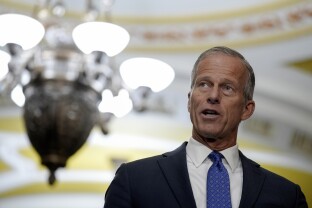Republicans managed to pass Donald Trump’s signature legislative achievement last week, a reconciliation bill extending tax rates and slashing Medicaid. But that’s not the entirety of the president’s legislative agenda.
While the House decided to take a week’s vacation, the Senate is back. And Republicans are turning their attention to a $9.4 billion rescission package that would codify some cuts from the Department of Government Efficiency.
Senate Majority Leader John Thune told reporters about three weeks ago that he was waiting for Appropriations Chair Sen. Susan Collins to take the next steps on the rescission bill.
“She’s referred it to Appropriations, and then she has a certain amount of time to act on it,” Thune said. “I would check with her and see what she is planning to do.”
But Republicans only have until July 18 to pass the rescission legislation. Under the rules for a rescission bill, Congress has 45 days to pass the measure once the White House sends the request to lawmakers. And time is running out on a measure that may not have the votes — or Collins’ support.
The Appropriations chair has been outspoken about cuts in the rescission bill to PEPFAR, President George W. Bush’s signature program for HIV/AIDS prevention and relief abroad. And other Republicans have shown discomfort with other cuts in the package, like the $7.4 billion in reductions to international aid programs such as the U.S. Agency for International Development and the $1.1 billion in cuts to public broadcasting.
Getting 50 votes for the rescission bill will be no small task — if it even gets to the floor.
When the Senate Appropriations Committee held a hearing on June 25 with Office of Management and Budget director Russell Vought, Democrats and Republicans seemed concerned about the precedent the rescission package might set for future congressional funding powers.
“It’s pretty clear in Article I what it is that we’re supposed to be doing when it comes to the power of the purse: appropriations,” Sen. Lisa Murkowski said.
During the hearing, Murkowski and Sen. Mike Rounds also raised concerns about the cuts to public broadcasting for rural communities. It’s unclear whether they’ve received assurances from the administration since then.
Other Republicans also brought up concerns about the implementation of the administration’s freeze on foreign aid, pressing Vought on specifics for what the rescission package would cut.
“There’s plenty of absolute nonsense masquerading as American aid that shouldn’t receive another bit of taxpayer funding,” Sen. Mitch McConnell said. “But the administration’s attempt to root it out has been unnecessarily chaotic.”
Democrats on the committee also criticized Vought for the administration’s use of rescissions, which used to be a more common executive tool but have not been successfully completed by a president since Bill Clinton in 2000.
Senators didn’t seem impressed.
“I really want to emphasize that this strategy of using delays, and freezing and impoundments and slow-walking contracts and rescissions, partisan rescissions, pocket rescissions at the end of the fiscal year, are all part of an unconstitutional plan to steal the power of the purse from Congress,” Sen. Jeff Merkley said.
After the hearing, Collins told reporters she was seeking “fundamental changes” to the bill.
If she got them, that would necessitate another vote in the House, where the rescission package barely passed. All the while, that 45-day clock is ticking.
Democrats NOTUS spoke to in June were skeptical that the administration would respond to any congressional effort to rein in the president’s spending cuts. But, like with reconciliation, they’re hoping to use the endless amendment process to cherry-pick aspects of it. They believe they might have some Republican support in that — and even one successful amendment would jeopardize the measure with its tight timeframe.
Plus, the rescission bill is not the only item on the Congress’ to-do list. One way or another, lawmakers have to begin getting serious about funding the government. Republicans in both chambers still maintain that they plan to pass individual appropriations bills.
But with so little legislative time before government funding runs out — there are only about six legislative weeks scheduled before the Sept. 30 funding expiration date — it remains to be seen how Republicans will ultimately handle all the appropriations bills.
Leaders have said they want to avoid continuing resolutions or an omnibus, but Republicans and Democrats have no agreement on top-line spending numbers. And unlike the rescission bill or reconciliation, Democrats can filibuster spending bills.
If Republicans want to pass government funding legislation, Democrats will have a say.
Sign in
Log into your free account with your email. Don’t have one?
Check your email for a one-time code.
We sent a 4-digit code to . Enter the pin to confirm your account.
New code will be available in 1:00
Let’s try this again.
We encountered an error with the passcode sent to . Please reenter your email.


